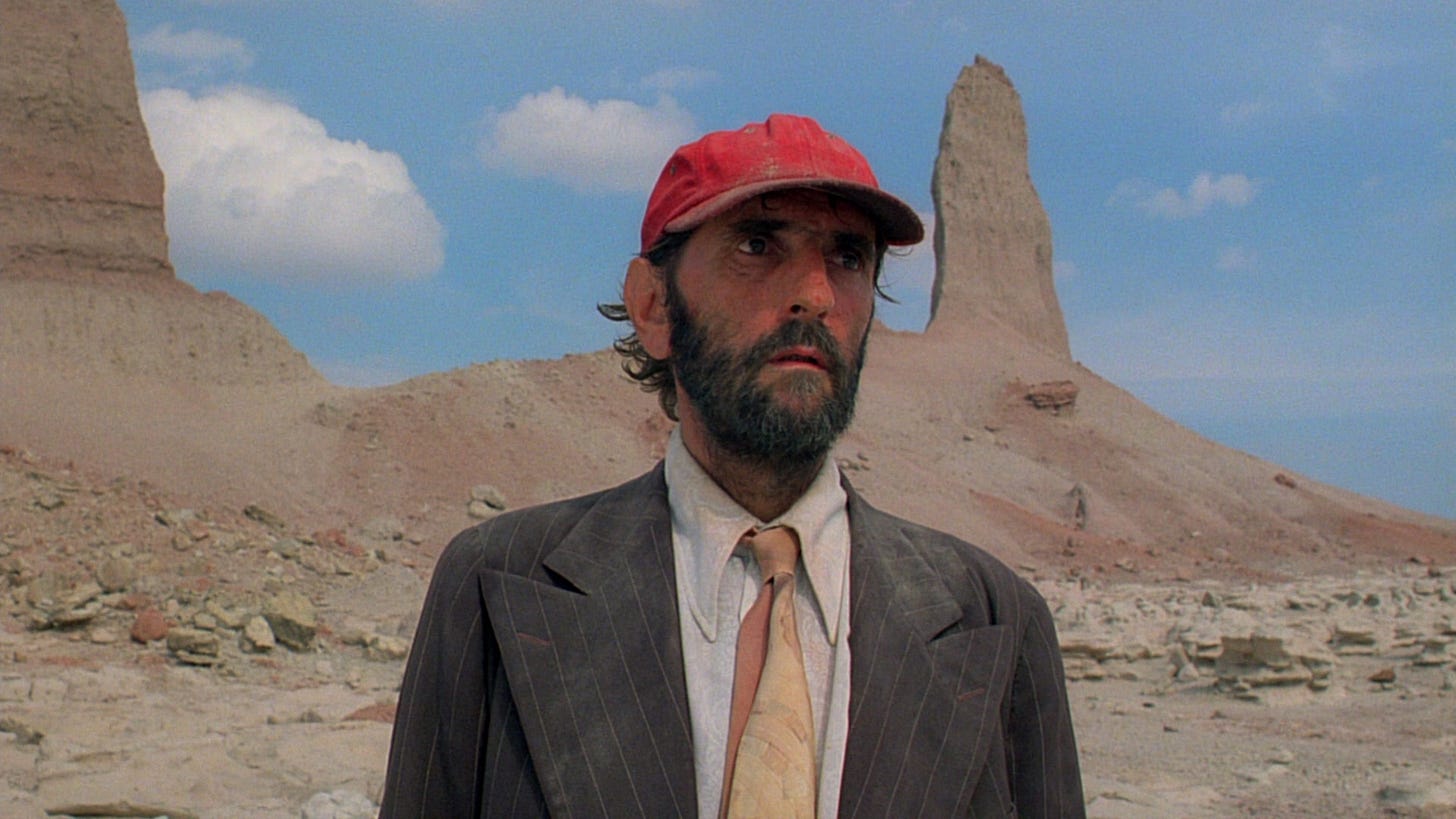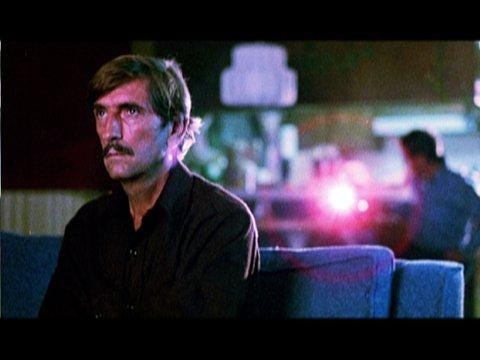I truly believe Paris, Texas is a perfect film. Taking us on a sun-soaked journey through the American southwest, director Wim Wenders shows us an American fairytale. There is no perfection to be found within the characters of Paris, Texas, no altar boys or angels. The film is about troubled men and women, trying only to do the best not only for themselves but for those they love. A film about the deepest loves one can imagine and what happens when those connections are broken, and how to forgive oneself for breaking that love.
The love featured in the film is not lost nor unrequited. To the contrary, it never even wavers, and it’s in this strength of love that it is untenable. The film is about love unreachable, unachievable, a love that cages people instead of freeing them. If someone loves so strongly that they can’t let go, is that love, or is that desperation? The love Trevis has for Jane formed the way he saw the world, and when he feared that love was slipping from his grasp he faltered, tragically and significantly and in a way he may never forgive himself for. Not only did he fear he could never live up to the love he felt for her and for their son, she felt constrained by his love, an overbearing sense that she was all Travis had. It’s these perceptions of each other that resonate so deeply for the viewers.
When we first meet Travis, he’s silent, a mute, wandering through the desert. One can not mistake silence, can not twist it into something it is not. Travis insists on staying silent and wandering the Texas plains, as there is no mistaking silence for anything else and no mistaking the Texas dessert for anywhere else. He is searching not for love but for assurance and stability. Penance. But this is a false belief, a mirage in the sun-baked soil, as Travis can not exist on his own, and can not lead a life of silence. He may be a man of few words, but he does have words, and life, and existence, and whether he knows it or not he must be perceived. This is why, even after so many years, he has held onto his brother Walt’s phone number. He knew, all that time wandering, that he would eventually need to go home.
Walt’s love for his brother is unwavering. He gets annoyed and frustrated with him, yes, but those emotions blossom out of love. When it comes down to it, Walt gives Travis everything he asks for and more, all simply hoping to get his brother back in his life. Walt never saw the Travis that ended the relationship with Jane, never saw the Walt that loved to the point of almost obsession. He only ever saw his brother, and this brotherly love may have even blinded him to the faults of Travis. It is Walt’s love that brings Travis back to the real world, leaving behind the parched purgatory we found him in and bringing him back to civilization and the real world. And while this is a world that Travis soon realizes he can not exist in, not without seeking forgiveness from Jane, it is still this reentry to the world that brings Travis to his eventual conclusions.
Walt’s life is a mirror image of Travis. Even their wives are mirrors of one another, young blonde women who have fallen madly in love with an older man. When Travis disappears it is Walt who steps in to father Travis and Jane’s son Hunter. Walt and his wife Anne are so similar to Travis and Jane that they have completely filled in the role of parents, with Hunter calling them mom and dad. But it’s in the small details that the two couples are separate and distinct, that one burnt out while the other lingered. And it’s in these small details that Hunter eventually returns to his natural parents, near strangers to the very young boy, even though his surrogate parents love him as if he is their own (Anne even fears that they will lose him.) The draw of Travis and Jane, the untenable power of their love, is something so strong even Hunter can not deny it.
In this duality of fatherhood we can see the idea of perception being outlined again, and how perception can colour our world. Hunter first sees Travis as a stranger, and all but refuses to call him dad. This changes over time as they spend more time together, and by the time Travis and Hunter walk home together on opposite sides of the street before reuniting, Hunter has fully shifted who he sees as his father. Nothing has fundamentally changed, but his perception of the world has shifted dramatically. And with this shift the projection of his life is also changed radically.
This idea of perception and shifting values is first brought up in Travis’ first discussion in the film. He asks Walt if they could go to Paris. Walt, naturally, assumes his brother is speaking of Paris, France, and at first assumes his brother has lost some of his faculties (as these are the first words he has said). But Walt is speaking of the titular Paris, Texas, a place that only exists in a singular photograph in Travis’ possession. He has purchased land in Paris, a lot, and wishes to see it. Paris is never shown in the film, instead only being a figment of Travis’ imagination. The photograph allows Travis to envision a future, a life with Jane and their son again, a world that will never exist. Travis says he wants to go to Paris but if he ever were to, his fantasy of the future would completely fall apart. Instead, he simply holds onto the photograph and his idea of what it could be. His perception of Paris.
This romantic ideation of Paris is why the naming of the town is so important. Paris, France has a worldwide reputation for grandiose romantic gestures, the City of Love. But this is not the city Travis wishes to be in, instead choosing a city that to him represents a different love, a quieter love that burns just as bright. A cowboy’s idea of love, rugged and tough and needing work but deeper and richer than a diamond passed on bent knee. Travis wants to build his love, like a house in an empty lot, from the ground up. In this idea of Paris, Texas, we can see Travis ask for forgiveness for his past. There is no future is Jane is unable to forgive him, and he knows that his actions were not out of love but out of fear and desperation. Paris, Texas is not only the romanticization of an American love story, but begging for an unbearable past.
By fully facing his past, Travis is able to finally accept the future and how he is able to mend the wounds he has wrought. Travis initially ran, then tried to hide, then finally knew he had to accept the consequences of his actions. Paris, Texas is a lie and he is able to see that when he finally encounters his wife in the sex booths. These booths mirror the lie he has been telling himself whenever he looks at the picture of his land in Paris. They are false, with fake furniture and rooms that don’t exist in reality. He sees Jane in these settings and knows immediately that if he were to try and take her to Paris that it would never be real, never like how it was before. Jane, for her part, is unable to see Travis and her past, only able to see herself reflected in the one-way mirror. It is only after she turns off the light, allowing herself to delve into the darkness that was her marriage, that she is able to see him, to face her past and to remedy their love. The booths for her were a facsimile, a world in which she could be a young girl without the responsibilities of the real world. Upon seeing Travis’ face and hearing his voice, though, this crumbles away, and she knows she must return to her son.
In the end, Travis realizes that love is about letting go. He held on so strongly, so vigorously, that he tore both his family and himself apart. Upon stitching his family back together, reuniting mother and son, he realizes that he can not be a part of this family, that his fear of losing them would be a self-fulfilling prophesy. And so he lets go. He lets go of his son, his wife, his brother, and drives off into the Texas sun. No longer mute, no longer afraid to say the truth for the truth has already been voiced, he can only go forth into the world, into a fantasy I imagine to be much like a town a Texas called Paris.






